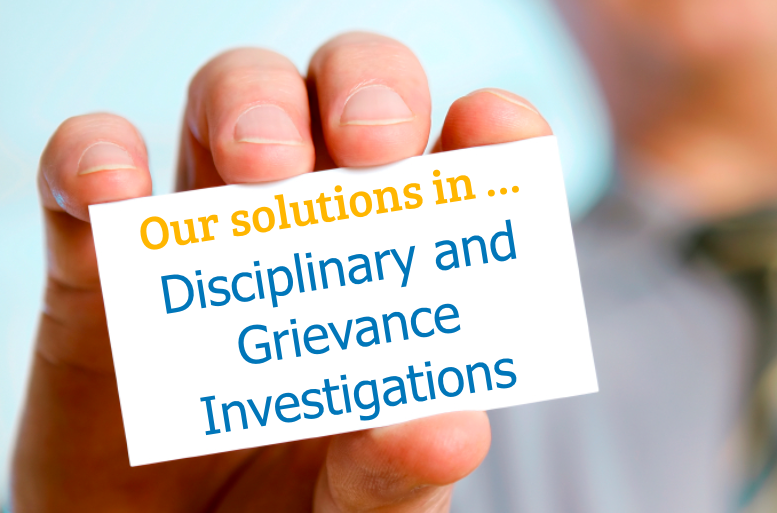Disciplinary and Grievance Investigations
Disciplinary and Grievance Investigations
 From time to time managers find need to discipline a member of staff. Hopefully it’s not often but it’s part of a manager’s lot. When faced with a disciplinary, managers have several worries – getting procedure right, balancing argument and making a good final decision. If they’ve good quality information available from the outset, everything else falls into place. All disciplinaries start with an investigation to uncover the facts.
From time to time managers find need to discipline a member of staff. Hopefully it’s not often but it’s part of a manager’s lot. When faced with a disciplinary, managers have several worries – getting procedure right, balancing argument and making a good final decision. If they’ve good quality information available from the outset, everything else falls into place. All disciplinaries start with an investigation to uncover the facts.
TimelessTime consultants have gathered hundreds of witness statements and have helped hundreds of managers navigate disciplinaries and grievances. Here are some of the issues we’ll engage with.
Grievance Investigations
Raising a grievance is the only formal recourse an employee has to challenge management decisions. Hearing grievances and making objective grievance decisions supports commitment in all staff. Grievance decisions depend on the manager having good quality information. Quality information comes from a thorough investigation that uncovers the facts.
Thorough Investigations
TimelessTime consultants conduct robust, thorough investigations. Evidence uncovered during disciplinary or grievance investigations must support or refute the claims or allegations made. This sets the scope of the investigation and the nature of questions asked. The result is a report laying out the facts upon which the chair (of the disciplinary or grievance meeting) can rely when conducting the disciplinary or grievance meeting.
Making Argument
Disciplinaries and grievances are typically triggered by a claim or allegation made either by a manager (in the case of a disciplinary) or by an employee (in the case of a grievance). In the case of a disciplinary, it could be a claim or allegation about the behaviour of an employee. In the case of a grievance, it could be a claim or allegation about how an employee has been unfairly treated by a manager.
A decision will then subsequently be made about whether that claim is supported or refuted. That decision is made in a disciplinary or grievance meeting. The chair of the meeting makes the decision based on information available to them. That information provides evidence. The chair will decide if the evidence makes the argument compelling or weak. If compelling, the chair will likely uphold the claim. If weak or unclear, the chair will likely dismiss the claim.
Arguments are claims supported by evidence. Successful management of disciplinaries and grievances involves building evidence to accept or reject arguments.
Gathering Evidence
Information, leading to evidence, is gathered by an investigating officer – an impartial employee or external consultant. This person needs appropriate qualification.
Typically, they should understand organisations, employment and the role of the firm’s policies and procedures. Disciplinaries and grievances are done in a context of the employment contract – employees voluntary submit to the firm’s disciplinary and grievance codes. It’s not a civil or criminal law scenario and the use of private investigators or former police officers would be inappropriate.
The investigating officer decides what information to seek and what ‘avenues’ to follow considering the context of the claim or allegation and the firm’s activities.
Disciplinary and Grievance Investigations
The information gathered can be very complex. There can be a huge amount of it. The information is gathered for the manager who will chair the disciplinary or grievance meeting. But the investigating officer must also be mindful that the information may be read by lawyers and a tribunal panel (if the employee were to appeal the decision). The information must be meaningful, easily understood by all and gathered without judgement or bias.
Using Evidence
The investigating officer needs to present the evidence in witness statements and in a written report. This report may include physical artefacts and audio and visual records.
TimelessTime consultants use a number of research-accredited techniques for deriving evidence from information and for presenting evidence in a coherent, logical and easily assimilated fashion.
TimelessTime methods lead to easy interpretation of the facts.
Investigation is not just about talking to some people and writing up notes. It’s a science that must be embraced in order to reach a fair outcome for all.
Here's what some of our clients said about us
The project delivered a viable and maintainable organisation-wide rewards strategy, system and structure for my organisation. The project kept exactly to plan over the four-month project lifecycle and delivered exactly what was agreed.
When I had shops and 27 staff I used another service for HR issues; but I wish I had used TimelessTime. More personal and responsive and they know what they are talking about. Also, much better value for money.
We were impressed by the structured approach taken to the investigation and presentation of evidence. Use of the psychological definition (of harassment) requiring that there was both event and arousal of sensibilities provided a much more robust criteria for use in our assessment than the legal criterion alone.